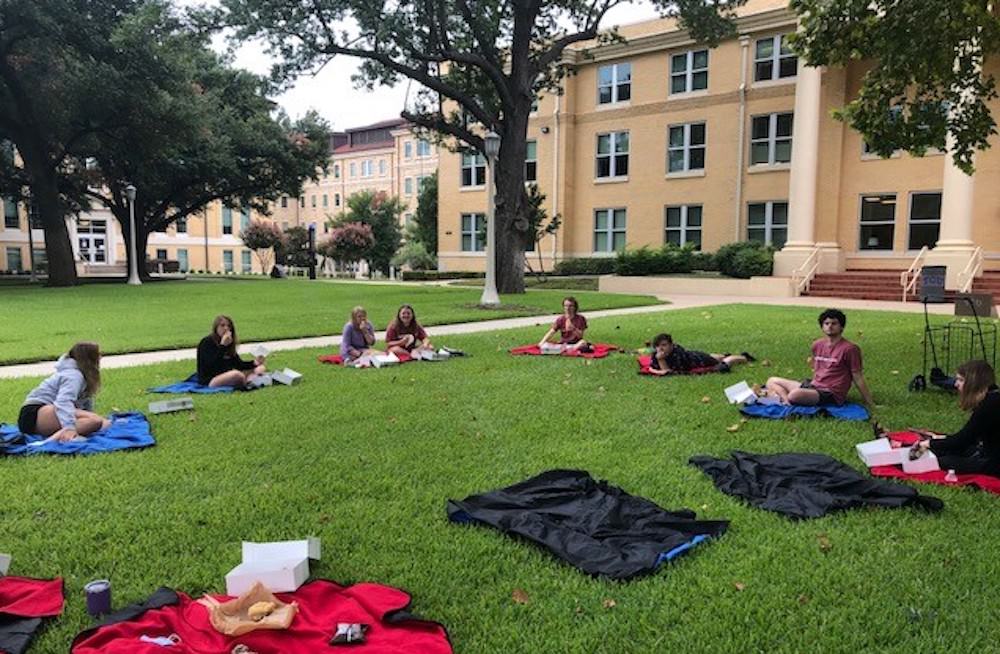While the number of people in the United States that have received a COVID-19 vaccine has increased over the past few months, the current academic year has been and, in many cases, continues to be incredibly difficult for students, faculty and staff at colleges and universities around the country. Amid the uncertainty and anxiety of these days, college chaplains have continued to minister to students and their wider community in creative ways. HELM caught up with a few chaplains at Disciples-related schools to learn about how they have stayed connected with students.
Sedaric Dinkens, Chaplain at Jarvis Christian College in Hawkins, Texas, shared that trying to communicate and minister to students during the pandemic has been challenging, noting that “Separation and distance are at the heart of the communicative challenge. The pandemic forced our campus, like many others, to send our students home and continue our academic endeavors through distanced and online learning.” Given these circumstances, Dinkens found ways to try and connect with students to let them know that while they may be physically distant from their campus community, he and the university were still there to support and journey with them: “Early in the pandemic, I began to send a weekly email to our students with a set of questions: How are you? Tell me the challenges you are facing with the switch to online learning? What may I do to assist you? Do you have any prayer concerns? Each email concluded with a special phone number established specifically so that students may reach out to me through calling or text message. Whenever I became aware of a specific event in the life of a student, the student received a text, a follow-up email and a phone call. Sometimes, if the circumstances warranted it, the student was connected to Counseling services for follow-up conversations.”
While he describes these months as challenging, Dinkens also mentions that there have been many real and meaningful connections made: “Pandemic communication has also been exhilarating. While I have been told many stories about the impact of our communication efforts, one specific story comes to mind. During the pandemic, a student’s father passed away from a heart attack. After I received the notification of his demise, each day I called the student and even requested their permission to conference with them via video chat with a follow-up text. The student has testified that her love for Jarvis increased as well as a solidification of her faith in God.”
At Texas Christian University in Fort Worth, Texas, those serving in the Religious Life Office are using an old method of connecting with students in new ways. Lea McCracken, Associate Chaplain and Interim Director of Church Relations, said that for many years staff have relied on “walk and talk” meetings to make connections: “‘Walk and talks’ are part of our weekly pastoral presence with students as well as with faculty and staff. We have been doing them for years, so our students expect the invitation to walk and talk and also know they can ask for one anytime.” With the onset of the pandemic and the need for physical distancing, McCracken said she and other staff found this a natural way to continue to be present at a time when it was greatly needed. She shared that, “During the pandemic, a lot of our pastoral care appointments have taken place as walk and talks. Typically, each of us has at least one walk and talk of some form each day, whether it be with a student, a faculty or staff member, or each other.”
As infection rates in some areas of the country have declined, some schools have welcomed students back on campus. Others, like Chapman University in Orange, California, are still not completely back in person. Nancy Brink, Director of Church Relations at Chapman, shared that to keep Disciples students connected, “We hold weekly student-led worship on Zoom. We pay particular attention to the joys and concerns students share in worship and follow up with those who need extra care.” For those students who are living on or near campus, Brink has started hosting Friday evening outdoor pizza parties: “Students need to gather, get to know each other outside of a Zoom box, and enjoy positive community. All of us are terribly sick of online gathering, but we all agree that we have maintained strong connections, nevertheless.”

